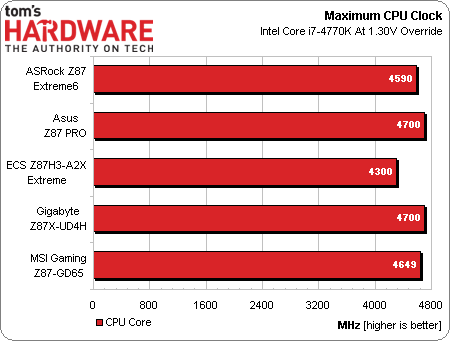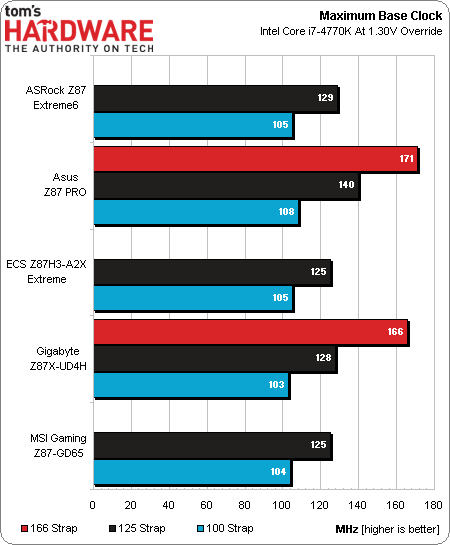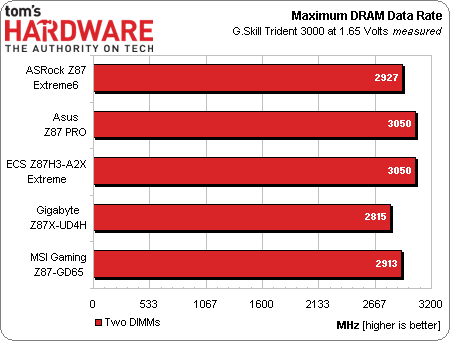Five Z87 Motherboards Under $220, Reviewed
Intel’s Haswell architecture displaces Ivy Bridge in its desktop line-up, bringing with it yet another new CPU interface. We tested six motherboards that claimed to be ready for your overclocking efforts, and included the five survivors in today’s review.
Overclocking
Why you can trust Tom's Hardware
| BIOS Frequency and Voltage settings (for overclocking) | |||||
|---|---|---|---|---|---|
| Row 0 - Cell 0 | ASRock Z77 Extreme6 | Asus Z87 PRO | ECS Z87H3-A2X Extreme | Gigabyte Z87X-UD4H | MSI Z87-GD65 Gaming |
| Base Clock | 90-300 MHz (0.1 MHz) | 80-300 MHz (0.1 MHz) | 99.5-300 MHz (0.1 MHz) | 80-267 MHz (0.1 MHz) | 90-300 MHz (0.1 MHz) |
| CPU Multiplier | 8.0-120x (1x) | 8.0-80x (1x) | 16-80x (1x) | 8-80x (1x) | 8-80x (1x) |
| DRAM Data Rates | 800-4000 (200/266.6 MHz) | 800-3200 (200/266.6 MHz) | 800-3000 (200/266.6 MHz) | 800-2933 (200/266.6 MHz) | 800-3200 (200/266.6 MHz) |
| CPU Vcore | 0.80-2.00 V (1 mV) | 0.001-1.92 V (1 mV) | 0.00-2.00 V (1 mV) | 0.50-1.80 V (1 mV) | 0.80-2.10 V (5 mV) |
| VCCIN | 1.20-2.23 V (10 mV) | 0.80-3.04 V (10 mV) | -1 to +1 (Offset Only) | 1.00-2.91 V (10 mV) | 1.80-3.04 V (10 mV) |
| PCH Voltage | 0.97-1.32 V (5 mV) | 0.70-1.50 V (12.5 mV) | 1.06-1.68 V (10 mV) | 0.65-1.30 V (5 mV) | 1.05-1.68V (10 mV) |
| DRAM Voltage | 1.17-1.80 V (5 mV) | 1.20-1.92 V (5 mV) | 1.10-1.82 V (5 mV) | 1.15-2.10 V (5 mV) | 0.30-2.45 V (25 mV) |
| CAS Latency | 4-15 Cycles | 1-31 Cycles | 4-18 Cycles | 5-15 Cycles | 5-15 Cycles |
| tRCD | 3-20 Cycles | 1-31 Cycles | 4-18 Cycles | 4-15 Cycles | 5-15 Cycles |
| tRP | 4-15 Cycles | 1-31 Cycles | 4-18 Cycles | 4-15 Cycles | 5-15 Cycles |
| tRAS | 9-63 Cycles | 1-63 Cycles | 10-40 Cycles | 5-63 Cycles | 10-40 Cycles |
Most of the firmware ranges presented by today’s motherboards are extremely unrealistic, as LGA 1150-based processors are generally limited to around 10% base clock alteration (beyond base clock ratio changes) and a maximum DRAM data rate of 22x 133 MHz (2,933 MT/s). Higher memory multipliers aren’t supported by Haswell CPUs, but combining a functional multiplier with a higher base clock is still an option.
Gigabyte ties Asus for the highest CPU clock, with MSI trailing only slightly behind. ECS reaches 4.5 GHz, but I wasn’t able to prevent it from using the standard two-ratio drop to 4.3 GHz when loading four cores.
Asus and Gigabyte also have the highest base clock, though Intel told our editor-in-chief, Chris Angelini, that ratio selection isn’t available for multiplier-locked Haswells. Other boards had trouble using the 166 MHz ratio, though we don't see any practical reason to do so with our air-cooled Core i7-4770K.
ECS bragged to me that it had the best-overclocking motherboard, and when I told the company otherwise, it referred to memory data rate. Indeed, the Z87H3-A2X ties Asus’ Z87-Pro for top memory clock.
Current page: Overclocking
Prev Page Power, Heat, And Efficiency Next Page Picking Our First Z87-Based WinnerGet Tom's Hardware's best news and in-depth reviews, straight to your inbox.
-
Someone Somewhere Who did you get the CPU from? Given the Haswell launch article said they were unlikely to be able to hit 4.5GHz+, is this a cherry-picked chip from Intel?Reply
Could we see some MBs around the $130-$140 mark? They're the interesting ones IMO, and would toast most of these in terms of value. -
Crashman Reply
Intel says it doesn't cherry-pick chips for reviewers...10911132 said:Who did you get the CPU from? Given the Haswell launch article said they were unlikely to be able to hit 4.5GHz+, is this a cherry-picked chip from Intel?
-
Memnarchon Thank you. I was looking forward for a review like this. I read some reviews and the o/c was varying from mobo to mobo lot. So if the same cpu was used, 4,3Ghz to 4,7Ghz is a lot of difference. Because if your cpu would o/c to 4,3Ghz most we would tell its a crap sample Haswell sucks on o/c etc etc, but if it was be able to clock to 4,7Ghz we would say its a nice sample.Reply -
cangelini Reply
Yes, the CPU comes from Intel. Almost certainly it was cherry-picked. But this is why we didn't rely on these CPUs for our launch coverage--it makes a lot more sense to go to a source with hundreds of boxed processors on the bench to get a real sense for what Haswell will do in the wild. At least for this round-up, the variable changing is the motherboard. So, we derive as much meaning as possible with a review sample that hits 4.7 GHz on one board and 4.5 GHz on another.10911132 said:Who did you get the CPU from? Given the Haswell launch article said they were unlikely to be able to hit 4.5GHz+, is this a cherry-picked chip from Intel?
Could we see some MBs around the $130-$140 mark? They're the interesting ones IMO, and would toast most of these in terms of value.
-
Someone Somewhere Yeah - but if people think that their chip is going to hit 4.7 on a good board, then find they can't get 4.5, they can be upset.Reply
OTOH, the launch coverage said that was at 1.2V, while this is 1.3V, so I guess a few hundred MHz extra is reasonable.
Lot more variation than on IB's review: http://media.bestofmicro.com/X/O/335580/original/image019.png -
JOSHSKORN Isn't there a flaw in the Z87 technology regarding sleep mode? Was it mentioned in the article? I didn't see it.Reply -
Jason Louie do these board suffer from the rumoured usb3 sleep issue? or are they the fixed B3 steppings ?Reply -
Crashman Reply
Did you read the Haswell review? All current boards are affected, no future boards will be, there's nothing to update here, and the flaw is virtually meaningless.10911218 said:Isn't there a flaw in the Z87 technology regarding sleep mode? Was it mentioned in the article? I didn't see it.
http://www.tomshardware.com/reviews/core-i7-4770k-haswell-review,3521-9.html
If you have one of the affected drives and can't be bothered to reconnect it when it goes offline, wait a couple weeks and buy a board from the new batch.
The differences between boards in today's review are overclocking, power consumption, and onboard features. None of those things will change with the new PCH batch, and firmware updates should improve both batches equally.
-
Jason Louie do these board suffer from the rumoured usb3 sleep issue? or are they the fixed B3 steppings ?Reply -
sna Hello,Reply
Can you guys please test 6 SSD in Raid 0 on these mobos ? this is the only Advantage of upgrading to a Haswell over ivy/sandy bridge.



